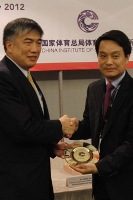SSI Forms Partnership With Regional Institutes In Preparation For Rio 2016 And Beyond
SSI Forms Partnership With Regional Institutes In Preparation For Rio 2016 And Beyond
 SSI Signs MOUs with China, Hong Kong and Korean Sports Institutes to Boost Sports Science and Medicine Support for Team Singapore
SSI Signs MOUs with China, Hong Kong and Korean Sports Institutes to Boost Sports Science and Medicine Support for Team Singapore
Singapore, 17 May 2012 - To help Team Singapore athletes prepare better for the 2016 Olympics in Rio and beyond, the Singapore Sports Institute (SSI) is tapping on its wider network of Asian Sports Institutes for more training, athletes development as well as sports medicine and sports science capability development opportunities. By collaborating with these sports institutes, the SSI hopes to increase its depth and breadth of sport science and medicine support for our athletes.
2. The MOU signings are part of the sports science and medicine symposium that is being held in Singapore on 17 and 18 May 2012. The conference brings together the widest representation of regional sports institutes to date, with delegates from China, Hong Kong, Japan, Korea and Malaysia taking part.
3. Established just two years ago, the SSI will certainly benefit from the vast experience of these well-established institutes, some of which have produced multiple Olympic champions. Areas of collaboration include cooperation in sports science and medicine research and development, sharing of data and research methodology, athlete and coach training exchange programmes, as well as specialist exchange and development programmes.
Sports Science and Medicine Research & Development
4. The China Institute of Sports Science (CISS) is the country’s oldest and largest sports research institute. With 50 years of experience under its belt, CISS has extensive knowledge in the area of elite sports science research. They are also very well versed in applying scientific research to enhance their athlete training systems. The SSI is certainly looking to tap into their expertise to further develop our nation’s capabilities in this area. CISS is also very much experienced in using traditional Chinese medicine (TCM) to treat sports injuries. This is a niche area of expertise that the SSI can look into to better serve our Team Singapore athletes.
5. Having recently visited the CISS facility in Beijing in February, Associate Professor Fabian Lim, Executive Director of the SSI said, “CISS is the lead organisation for the more than 100 sports institutes in China. The SSI is looking to incorporate more scientific research and evidence to enhance our training systems. Hence, the collaboration with CISS will be an effective gateway into the network of the sports institutes in China, enabling us to gain insights into their scientific and training capabilities, which in turn will be a key resource for our athletes.”
6. Through our partnership with these institutes the SSI’s aims to also further develop our local sports science and medicine specialists so that they are able to better care for our athletes. Professional attachments will give our scientists and trainers the opportunity to widen their knowledge in their respective specialisations, as well as the chance to apply their knowledge to a wider pool of athletes.
Athlete and Coach Training Exchange Programmes
7. One of the challenges of having a small athlete population is the practicality of heavy investment into setting up sophisticated facilities and programmes. However through SSI’s affiliation with these regional institutes, national sports associations (NSAs) with a smaller pool of elite athletes and coaches will be able to send them for training programmes at these partner institutes. Sports that could possibly benefit from this include archery, canoeing, and winter sports.
8. Lim June Liang, a Team Singapore speed skater who hopes to qualify for the Sochi 2014 Winter Olympics said, “I just started training on ice five months ago, and have made short trips to China and Korea to train with teams over there. Training with them has really helped me to improve by leaps and bounds. I am fully committed to putting in my all to try to qualify for the Olympics and an opportunity to train overseas for an extended period of time will certainly help a lot.”
Athlete Development Programmes
9. With about 70% of Team Singapore athletes, having to juggle between pursuing sporting and academic excellence at the same time, a holistic sports scholarship framework is needed to support our athletes in balancing their school and sports commitments. With over 20 years of experience in this area, Singapore will be looking to the Hong Kong Sports Institute (HKSI) as a guide when formulating our own framework. The SSI plans to introduce the sports scholarships system to better support Singapore’s sports talents soon.
10. Mylene Ong, a Team Singapore swimmer who will be starting university in January 2013 welcomes the new scheme. She said, “At the Singapore Sports School, classes were arranged around my training schedule. However, I will not have this luxury once I start university next year. As I plan to continue training full time, a scholarship will certainly give me the financial help and flexibility in timing that I need to effectively balance school and training.”
11. Ultimately, the aim of the SSI is to provide Team Singapore athletes with structured multidimensional training programmes by incorporating all aspects of sports science and medicine. Through the athlete services unit, the Institute looks to continue to develop a support system that takes care of the holistic development of the athlete, nurturing them into well-rounded individuals.

